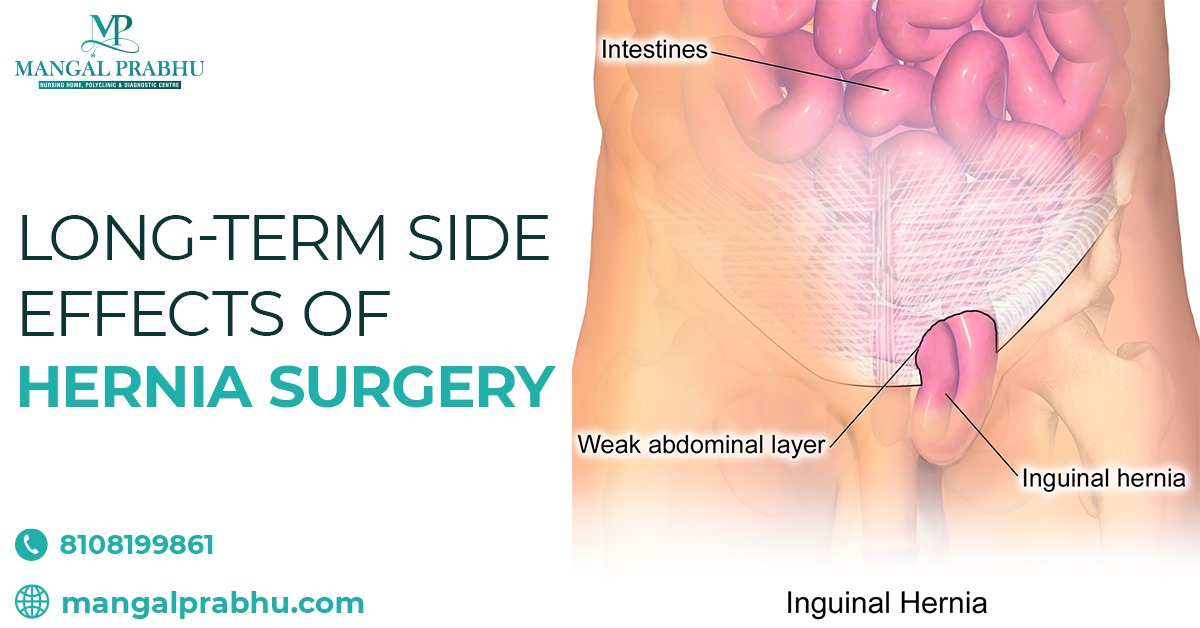
Hernia surgery is a common procedure that millions of people undergo each year to repair weakened or torn abdominal muscles. While the surgery is generally safe and effective, it’s essential to be aware of potential long-term side effects that can occur after the procedure. In this article, you can explore the long-term side effects of hernia surgery and strategies for managing them.
Overview of Hernia Surgery
Hernias occur when internal organs or tissues push through weakened or torn muscles, creating a noticeable bulge or lump. Surgery is often recommended to repair the hernia and prevent complications. At Mangal Prabhu Hospital, where you can find the experienced Hernia Surgeon in Navi Mumbai, patients receive comprehensive care and advanced surgical techniques to ensure successful hernia repair.
Short-term Side Effects of Hernia Surgery
Before delving into long-term side effects, it’s important to briefly mention the short-term side effects that patients may experience immediately after hernia surgery. These can include:
- It is normal to experience pain, swelling, and bruising around the surgical site. This discomfort usually subsides in the days and weeks following the surgery.
- Anesthesia and pain medications can cause temporary nausea and vomiting after surgery.
- Patients may need to restrict physical activity and avoid heavy lifting for a certain period to allow the surgical site to heal properly.
Long-term Side Effects of Hernia Surgery
While hernia surgery is generally successful in repairing the hernia, there are some potential long-term side effects that patients should be aware of:
- Some individuals may experience chronic pain or discomfort at the surgical site, known as chronic post-herniorrhaphy pain. This condition can persist for months or even years after the surgery.
- Although hernia surgery is intended to provide a permanent solution, there is a small risk of hernia recurrence. It can happen if the repaired tissues weaken or tear again over time.
- It’s common to experience numbness or altered sensation around the surgical scar. It usually improves over time but may not completely resolve in some cases.
- In rare instances, hernia surgery can lead to scar tissue formation that causes bowel obstruction. Symptoms may include abdominal pain, bloating, and constipation.
Strategies for Managing Post-Surgery Side Effects
If you experience long-term side effects following hernia surgery, here are some strategies to manage them effectively:
- Consult your healthcare provider for pain management options, including physical therapy, medications, or nerve blocks.
- Follow your surgeon’s post-operative instructions diligently, including avoiding heavy lifting and maintaining a healthy lifestyle to reduce the risk of hernia recurrence.
- Gentle massage and moisturizing of the surgical scar can help improve its appearance and reduce sensation changes.
- Schedule regular follow-up appointments with your hernia surgeon to monitor your recovery and address any concerns promptly.
Conclusion
Hernia surgery is a valuable procedure that can relieve and prevent hernia complications. While potential long-term side effects, such as chronic pain or recurrence, are relatively rare. Most patients experience successful outcomes. If you require Hernia Treatment in Navi Mumbai, Mangal Prabhu Hospital is home to experienced hernia surgeons who can provide comprehensive care and guidance throughout your surgical journey. Open communication with your healthcare provider is key to managing any post-surgery side effects and ensuring a successful recovery.

